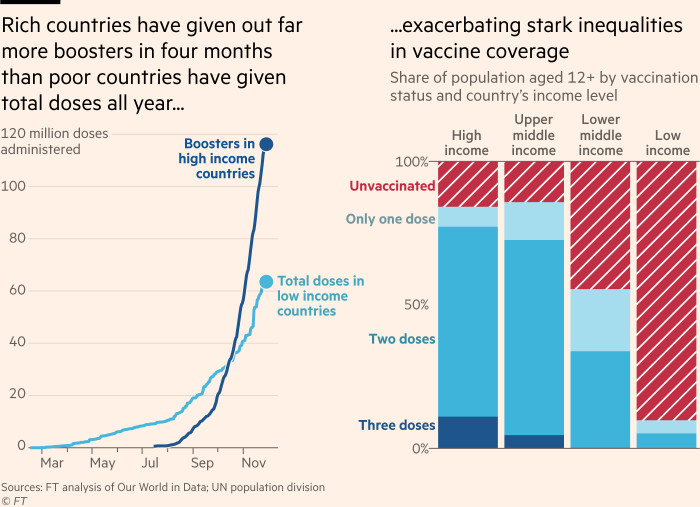One of the main figures behind the Covax vaccine initiative has questioned why rich countries are ramping up their booster programmes in response to the Omicron coronavirus variant, and insisted that priority should be inoculating the large number of people worldwide who are still waiting for a first jab.
“The most important thing is that we still need to vaccinate . . . high-risk people everywhere, and that priority needs to be a global priority, not just a country priority,” said Seth Berkley, chief executive of the Gavi vaccine alliance that helped create the UN-backed Covax scheme.
In South Africa, where a surge in coronavirus cases has been linked to the Omicron strain, less than a third of people have had at least one shot. According to the World Health Organization, only 5 per cent of people in African Union member states were double vaccinated by mid-November.
The US and the UK this week moved to offer booster shots to all adults as global health officials appeared increasingly anxious about the heavily mutated coronavirus strain first detected in southern Africa. Unusually, the UK is offering top-ups just three months after a second shot, while most countries require at least a six-month gap.
“Where is the science that suggests three-month boosters make sense?” Berkley said in an interview with the Financial Times.
Scientists and health officials have long said that uneven vaccine coverage heightened the likelihood of complex new variants emerging.
Soumya Swaminathan, the WHO’s chief scientist, said the health body had been warning “for many months now” that inequitable distribution of vaccines would increase the chances of mutations and new variants.
“If we had used the vaccines produced so far in a rational and fair manner, we wouldn’t be seeing the high death rates, two years into the pandemic,” she said. “Even now, it’s not too late to act. We need the vulnerable and high-risk populations everywhere to be protected urgently.”
Covax was set up last year with the Coalition for Epidemic Preparedness and Innovation, Gavi and the WHO to help secure vaccines for the developing world.
The scheme has delivered 582m doses to date. But it has suffered from a lack of transparency by drugmakers, manufacturing issues, export bans and what Berkley said was “hoarding” by richer countries.

While it is unclear whether the existing range of vaccines will provide the same level of protection against Omicron as they have done with previous strains, Moderna’s chief executive Stéphane Bancel predicted existing vaccines will be much less effective, although other manufacturers such as Oxford/AstraZeneca and BioNTech/Pfizer have been more optimistic.
With Moderna and Pfizer working on new vaccines to target a variant that the WHO has said poses a “very high risk”, Berkley said developing nations risked being put to the back of the queue again.
“We must do everything to avoid a vaccine nationalism 2.0 scenario developing, where rich countries tie up supplies of new, variant-adapted vaccines if specific vaccines are required,” he added.
“It’s only with Delta that they [rich countries] realised if they didn’t protect the developing world they were at risk of having these new variants.”
Yet Airfinity, a health analytics company, said that in a best-case scenario where all manufacturers quickly scaled up production and switched focus completely from other Covid vaccines, it would take until next October for 6bn doses of Omicron-targeted vaccines to be made available.
Countries around the world have moved to impose travel bans on southern Africa in response to the threat from Omicron, although the WHO has cautioned that borders should remain open, and testing and sequencing strategically deployed.
